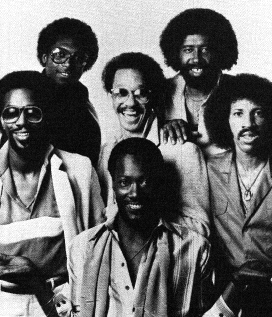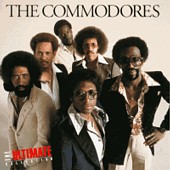|
Together they found William King, a trumpeter in the school band, and rehearsed assiduously. Calling themselves the Mystics, they brought down the house at the talent show. After that, they began to play dances, and talked about someday being "bigger than the Beatles." When another campus group, the Jays, broke up, keyboard man Milan Williams came in. In honor of their new member, the others decided to rename the band. William threw a dictionary up in the air, stuck his finger in at random, and pulled out a plum of a name -- the Commodores. For years afterward, they were to joke about how close they came to being called "the Commodes."
The Commodores played locally for $15 to $20 a night, and all the fish sandwiches they could eat. In 1969, they added drummer Walter Orange and bassist Ronald LaPread. By 1970, they were touring extensively. Motown signed the Commodores in 1971, and let them open shows for the Jackson Five. "We kind of became big brothers to the J5," recalled Lionel. "We stayed with them for almost three years." Finally, in 1974, the Commodores began to record. The group's early hits, such as "Machine Gun" (1974) and "Slippery When Wet" (1975) were ragged, funky R&B, appealing mainly to blacks. Then, in 1976, their first ballad, "Sweet Love," became a Top 5 pop hit. After that, their records were unpredictable -- slow, fast, hard, soft -- even country and gospel. "People know us but they don't know us," said Ronald. "We're six different writers, six different producers, six different arrangers, and we come from six different ways." It showed, too, in such diverse hits as "Just to Be Close to You" (1976), "Easy" (1977), and "Brick House" (1977). Then, at a 1978 sound check, Lionel got the idea for the Commodores' first number-one single. "My father told me that in 35 years of marriage, he'd never told my mother how much she meant to him. I decided that I wasn't going to wait 35 years to tell my wife, Brenda."
In 1979, there were two more big hits "Sail On" and "Still." In 1980, "Old Fashioned Love" became a Top 20 single. By then, the Commodores had sold more than 25 million albums, and the end was nowhere in sight. "There's something different about us," said Ronald. "Maybe it's just a feeling, but six little country boys have evolved into a pretty fantastic musical force. The people we once looked up to are now looking up to us. We like to think that once you have been exposed to the Commodores, you will never have to settle for anything less than the best." In the early eighties, Lionel Richie began to pursue outside projects, including writing and producing for Kenny Rogers and Diana Ross. In 1982, he released his solo debut, Lionel Richie, featuring his Top 5 hit "Truly." In 1984, after Richie had formally departed for a solo career, the Commodores had a number-three hit with the Grammy-winning "Nightshift." In the United States to date, the group has been awarded three platinum albums and have sold over 40 million records worldwide. In the meantime, Lionel Richie's spectacular solo success eclipsed even the Commodores at their commercial peak. His number-one 1983 album Can't Slow Down won the Album of the Year Grammy in 1984 and contained five Top 10 singles ("All Night Long," "Running with the Night," "Hello," "Stuck on You," and "Penny Lover"). It was said to be the biggest-selling album in the history of Motown Records. In 1985, Lionel cowrote "We Are the World" with Michael Jackson, and the next year won an Oscar for the number-one song "Say You, Say Me." The streak continued in 1986 with his third solo effort, Dancing on the Ceiling, which featured five Top 20 singles. Those three albums alone were certified for U.S. sales of over 16 million copies. In addition, he has strong followings in the U.K., Canada, and throughout Europe. In 1992, following nearly six years' hiatus, Lionel returned with Back To Front, a greatest-hits package that included some of his work with the Commodores as well as three brand-new songs. He has won a number of awards, including the Oscar and five Grammies.
No comments so far, be the first to comment. |


